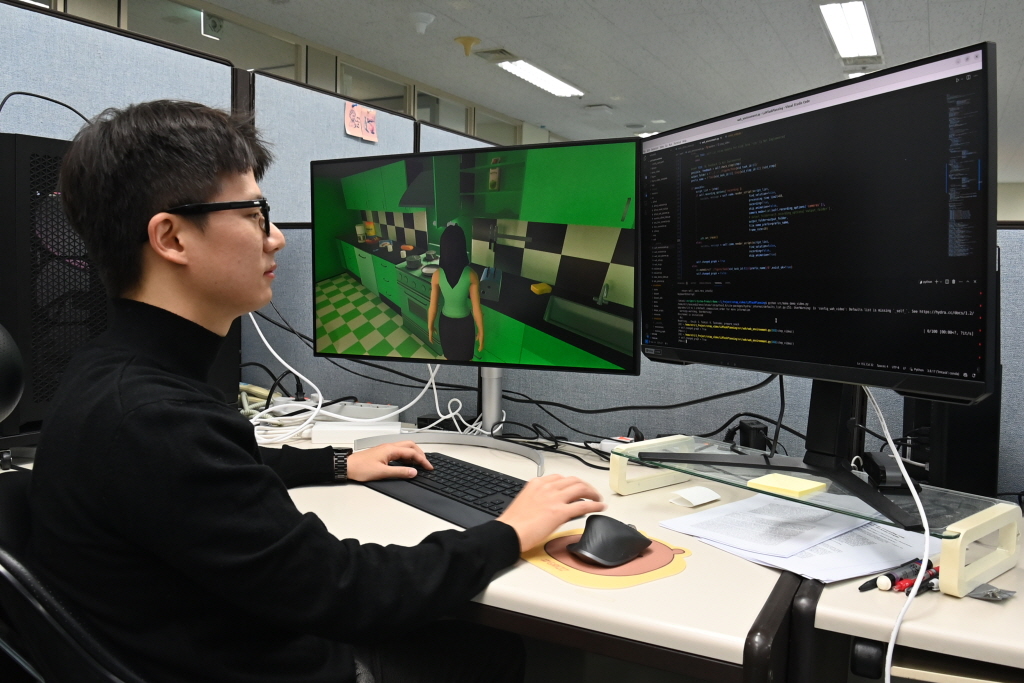한국전자통신연구원(ETRI)이 사람이 말로 작업을 명령하면 스스로 작업 절차를 이해하고 계획을 수립해 수행하는 절차 생성 인공지능(AI)의 성능을 자동 평가할 수 있는 로타벤치마크(LoTa-Bench) 기술을 개발했다.

▲ETRI 연구진이 절차 생성 인공지능(AI)의 성능을 자동평가하는 로타벤치마크(LoTa-Bench) 기술을 시험하는 모습
언어모델 절차 생성 성능 평가 비용·시간 단축 및 객관적 평가
국내 연구진이 대형언어모델(LLM)을 기반으로 만들어진 절차들의 성능을 자동으로 평가하는 기술을 세계최초로 개발하며, 빠르고 객관적인 절차 생성 성능평가가 가능해질 전망이다.
한국전자통신연구원(ETRI)은 사람이 말로 작업을 명령하면 스스로 작업 절차를 이해하고 계획을 수립해 수행하는 절차 생성 인공지능(AI)의 성능을 자동 평가할 수 있는 로타벤치마크(LoTa-Bench) 기술을 개발했다고 7일 밝혔다.
ETRI는 알프레드(ALFRED) 기반 벤치마크 결과, 오픈AI(OpenAI)의 GPT-3는 21.36%, GPT-4는 40.38%, 메타(Meta)의 라마2(LLaMA 2)-70B 모델이 18.27%, 모자이크엠엘(MosaicML)의 MPT-30B 모델이 18.75% 성공률을 보였다고 밝혔다.
규모가 클수록 절차 생성 능력도 우수했다. 성공률이 20%면 100개의 절차 중 20개를 성공한 셈이다.
연구진은 세계 최우수 인공지능 학술대회 중 하나인 표현학습국제학회(ICLR)에 논문을 발표하고, 본 기술을 이용해 대형언어모델 총 33종의 절차 생성 성능 평가 결과를 깃허브를 통해 공개했다.
연구진은 본 기술 개발로 대형언어모델을 이용한 로봇 작업계획 기술의 성능평가 시간과 비용을 대폭 줄일 수 있게 되었다고 말했다.
또한 연구진은 소프트웨어를 오픈소스로 공개함에 따라 기업, 학교 등에서 본 기술을 자유롭게 활용해 관련 기술의 발전을 앞당길 수 있을 것으로 기대하고 있다.
ETRI가 개발한 로타벤치마크 기술은 사용자의 명령에 따라 대형언어모델이 생성한 작업 절차를 실행하고, 결과가 지시한 목표와 같은지 자동으로 비교하여 성공 여부를 판단한다.
그래서 평가 시간과 비용을 최소화할 수 있고, 결과가 객관적이다.
성능 평가는 로봇과 체화 에이전트 지능의 연구개발 목적으로 개발된 미국 알렌인공지능연구소(AI2-THOR)와 미국 MIT(버츄얼홈, VirtualHome) 가상 시뮬레이션 환경에서 이뤄졌다.
“전자레인지에 차갑게 식힌 사과를 넣어라”라는 일상적인 가사 작업 지시 명령을 내리고 각 작업 절차를 포함하는 데이터셋으로 평가했다.
또한 연구진은 새로운 절차 생성 방법을 쉽고 빠르게 검증할 수 있는 로타벤치마크 기술의 이점을 활용해 데이터를 통한 훈련으로 절차 생성 성능을 개선할 수 있는 두 가지 전략도 발견했다.
컨텍스트 내 예제 선별법(In-Context Example Selection)과 피드백 기반 재계획(Feedback and Replanning)이다.
아울러 파인튜닝을 통한 절차 생성 성능 개선 효과도 확인했다.
ETRI 장민수 소셜로보틱스연구실 책임연구원은 “로타벤치마크는 절차 생성 AI 개발의 첫걸음이다. 향후 불확실한 상황에서 작업 실패를 예측하거나 사람에게 질문하며 도움을 받아 작업 생성 지능을 지속 개선하는 기술을 연구개발할 계획이다. 1가구 1로봇 생활 시대의 구현을 위해서는 본 기술이 반드시 필요하다”고 말했다.
ETRI 김재홍 소셜로보틱스연구실장은 “ETRI는 실세계에서 각종 임무 계획을 생성하고 실행할 수 있는 로봇을 실현하기 위해 파운데이션 모델을 활용한 로봇 지능 고도화 연구개발에 매진하고 있다”고 밝혔다.
본 기술은 과학기술정보통신부와 정보통신기획평가원(IITP)의 ‘사람중심 인공지능 핵심원천기술 개발 사업’의 일환으로 ‘스스로 불확실성을 자각하며 질문하면서 성장하는 에이전트 기술 개발’ 과제를 통해 수행됐다.